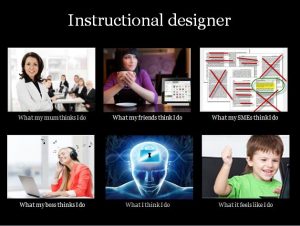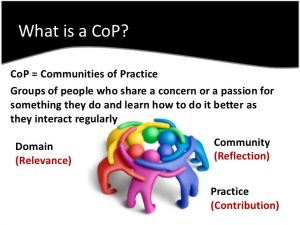
Growing up, I never heard a guidance counselor mention the instructional design field when describing career opportunities. As an undergraduate student thinking of a career in education, I thought the choices were limited to working as an instructor or as administrative staff. After a little bit of luck and a lot of hard work, I found that I have a passion for instructional design. I’d like to share how I found myself in the middle of a great instructional design team at UW–Extension’s CEOEL, some things I learned about the instructional design field while coming from an outside perspective into the instructional design community of practice, and some tips I picked up that may be of help to those interested in pursuing a career in instructional design.
Community of Practice
I began my entry into the instructional design community of practice as a student worker. I remember realizing that instructional design was a career I was interested in because of how excited I was to do the very basic tasks (e.g., link checks, quality assurance) required by my role. The CEOEL instructional design team has been instrumental in guiding me into the ID community of practice. I am thankful to have been introduced to the field by such a great team—they really put the community in community of practice. Part of learning about instructional design for me was being able to communicate and work with experts in the field. My team members were always open to impromptu conversations about any and all instructional design topics. As time went on, I progressed to working on more specialized instructional design tasks and cherished any opportunity to add to the ID community of practice. It has been exciting to reflect on my journey from a student worker to an intern and then to my current role as an instructional designer on the team.

Instructional Design Roles
Part of my journey has been learning about everything an instructional designer does (hint: it is a lot!). While I had experience with quality assurance and course component building, I learned much more about the field as an intern. At first, I didn’t realize the level of interaction instructional designers have with faculty. Designing a course is truly a team effort between instructional designers and faculty, and the full development process is a great display of teamwork. Instructional designers go well beyond the content development and curation work; for example, instructional designers understand how to incorporate technology into pedagogy effectively while keeping the student perspective in mind. I really enjoy discussing content with experts in various subject fields—it brings excitement to each new day. It is rewarding to know that, as an instructional designer, I am helping build a better course for students.
Working in the online world also provides opportunities for creative design within the learning management system. One aspect of instructional design that I enjoy is asking difficult questions that may not have clear or permanent solutions. There’s always room for improvement in course development and design.
Interested in Instructional Design?
As far as advice for those considering an instructional design career, I’d recommend the following:
- In addition to undergraduate- or graduate-level degrees in education, consider other ways to build your pedagogical background. Many institutions offer professional development certificates. For example, the following from UW-Madison’s Professional Certificate in Online Education. These can be a low-cost way to familiarize yourself with instructional design theories and practices.
- Volunteer with local non-profits to gain practical experience and build your portfolio. This can be especially rewarding if you volunteer with an organization whose cause you are genuinely interested in. These volunteer opportunities benefit both parties, as non-profits often are looking for ways to improve their community outreach and you will be able to practice your instructional design skills. Signing up for a volunteer based educational search is an easy way to stay up to date on educational opportunities in your local community. For example, VolunteerMatch or your local United Way have many available educational opportunities.
- Attend professional teaching/instructional design conferences. These events put you in contact with educational leaders, expose you to the current trends in instructional design, and help you identify what areas of instructional design are most interesting to you. Click on the following to view a list of popular professional, instructional design conferences.
- Get and stay active in the online community. Following people or groups within the instructional design community on social media is a great way to introduce yourself to the instructional design world. It gives you an opportunity to interact with leaders in the field as well. A great example of an ID community of practice can be found at reddit r/instructionaldesign. There you will find professionals interacting with those who are new, or looking to enter the ID field. Many ID resources and helpful tips are also provided within that community, like websites that list some of the top instructional design blogs.
It has been a whirlwind diving into instructional design, and it has been very rewarding. It’s exciting to be part of a growing field—especially as an ID on the cutting edge of online education at CEOEL. For those of you interested in instructional design, I recommend taking the above steps to determine whether it might be an ideal career path for you!
Donna says
This is more than fantastic!
Detail was very helpful.
Congratulations Eric
Michael Brian Shimer says
Thanks for the interesting article!
I am near completion of my degree in learning design and technology through UMUC. I started this path first as a certified teacher, then when I found myself on a hiatus due to military service, I decided that I should continue to hone my skills as an educator, even if I was out of the classroom. But at the time (early last year) I found that I couldn’t commit to attending college full-time. So I decided on finding a certification or credentialing program. That led me to edX and their MicroMasters programs.
I started by pursuing a MicroMasters in instructional design and technology through UMUC. After you complete that program (which is a wealth of hands-on experience and learning all by itself), I took the university up on its offer of 12 transfer credits to the full program. That’s 1/3 of the full degree at a fraction of the on- campus cost!
I’m just sharing this route as another alternative for entering the ID field. Currently I’m helping to redesign one of the classes that I took when I started the program on edX, and I’m excited to really get started working as an ID.
Thanks again for the article!
Michael Shimer